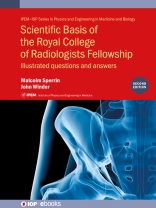Science and medicine have long been close partners, and this is particularly true in radiology where the availability of imaging techniques is central to diagnosis. An understanding of the science underlying an imaging process enables the development of new or improved techniques, comprehension of the imaging limitations and even the creation of a research portfolio. This volume is intended as an education resource to help study and pass the necessary exams in physics required for medical specialists. Accounting for changes in examinations and curricula, this new edition includes more than 50 new questions across all topics, and a new chapter on functional and molecular imaging.
Table des matières
Introduction
1 Basic physics
2 X-ray imaging
3 Imaging theory
4 Radiation protection
5 Computed tomography
6 Ultrasound
7 Magnetic resonance
8 Nuclear medicine
9 Functional and Molecular Imaging
A propos de l’auteur
Malcolm Sperrin is the director of the Department of Medical Physics and Clinical Engineering at the Churchill Hospital, UK, with a special interest in radiation medicine, especially nuclear medicine and radiotherapy. He also plays a significant role in radiation protection and contingency planning. In parallel to his conventional hospital duties, Malcolm also spends a lot of time teaching and lecturing with organisations including Oxford Postgraduate Medical School, The Open University and various Royal Colleges not to mention lectureships at Guildford and the University of the West of England. He is also a Fellow of both the Royal College of Surgeons and the Royal College of Radiologists.
John Winder worked at The University of Ulster from 2002 until 2017 as a reader in healthcare science, as a lecturer and researcher. His research interests are in 3D medical imaging, rapid prototyping (3D printing) and he has published more than 100 research papers and 7 book chapters, as well as supervised 11 Ph D students. He is known for his clear communication of science and has been guest speaker at a range of UK radiology and other clinical conferences. John is now self-employed at RJ imaging, Belfast, and works on scientific writing and creating customised anatomical models for the Northern Ireland National Health Service.












